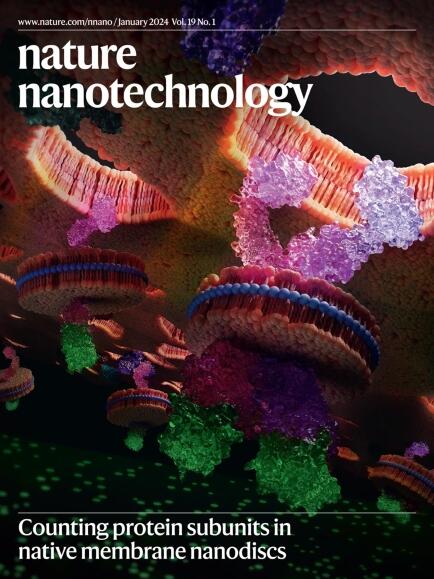Single-molecule sensing inside stereo- and regio-defined hetero-nanopores
IF 38.1
1区 材料科学
Q1 MATERIALS SCIENCE, MULTIDISCIPLINARY
引用次数: 0
Abstract
Heteromeric pore-forming proteins often contain recognition patterns or stereospecific selection filters. However, the construction of heteromeric pore-forming proteins for single-molecule sensing is challenging due to the uncontrollability of producing position isomers and difficulties in purification of regio-defined products. To overcome these preparation obstacles, we present an in situ strategy involving single-molecule chemical modification of a heptameric pore-forming protein to build a stereo- and regio-specific heteromeric nanopore (hetero-nanopore) with a subunit stoichiometric ratio of 3:4. The steric hindrance inherent in the homo-nanopore of K238C aerolysin directs the stereo- and regio-selective modification of maleimide derivatives. Our method utilizes real-time ionic current recording to facilitate controlled voltage manipulation for stoichiometric modification and position-based side-isomer removal. Single-molecule experiments and all-atom molecular dynamics simulations revealed that the hetero-nanopore features an asymmetric stereo- and regio-defined residue structure. The hetero-nanopore produced was characterized by mass spectrometry and single-particle cryogenic electron microscopy. In a proof-of-concept single-molecule sensing experiment, the hetero-nanopore exhibited 95% accuracy for label-free discrimination of four peptide stereoisomers with single-amino-acid structural and chiral differences in the mixtures. The customized hetero-nanopores could advance single-molecule sensing. This Article presents a single-molecule ‘synthesis by sensing’ approach that enables in situ stepwise generation of stereo- and regio-defined heteromeric nanopores to resolve structural and chiral differences of amino-acids in single peptide stereoisomers.


立体和区域定义的异质纳米孔内的单分子传感
异构孔道形成蛋白通常包含识别模式或立体特异性选择过滤器。然而,由于产生位置异构体的不可控性和区域定义产物的纯化困难,构建用于单分子传感的异构孔形成蛋白具有挑战性。为了克服这些制备障碍,我们提出了一种原位策略,即对七聚体孔形成蛋白进行单分子化学修饰,以构建立体和区域特异的异构纳米孔(异构纳米孔),亚基的化学计量比为 3:4。K238C aerolysin 的同源纳米孔固有的立体障碍指导了马来酰亚胺衍生物的立体和区域选择性修饰。我们的方法利用实时离子电流记录来促进受控电压操作,从而实现化学计量修饰和基于位置的侧异构体去除。单分子实验和全原子分子动力学模拟显示,异纳米孔具有不对称的立体和区域定义残基结构。质谱法和单颗粒低温电子显微镜对所制备的杂南孔进行了表征。在概念验证的单分子传感实验中,异纳米孔对混合物中具有单氨基酸结构和手性差异的四种肽立体异构体进行无标记分辨的准确率达到 95%。定制的异纳米孔可以推动单分子传感技术的发展。
本文章由计算机程序翻译,如有差异,请以英文原文为准。
求助全文
约1分钟内获得全文
求助全文
来源期刊

Nature nanotechnology
工程技术-材料科学:综合
CiteScore
59.70
自引率
0.80%
发文量
196
审稿时长
4-8 weeks
期刊介绍:
Nature Nanotechnology is a prestigious journal that publishes high-quality papers in various areas of nanoscience and nanotechnology. The journal focuses on the design, characterization, and production of structures, devices, and systems that manipulate and control materials at atomic, molecular, and macromolecular scales. It encompasses both bottom-up and top-down approaches, as well as their combinations.
Furthermore, Nature Nanotechnology fosters the exchange of ideas among researchers from diverse disciplines such as chemistry, physics, material science, biomedical research, engineering, and more. It promotes collaboration at the forefront of this multidisciplinary field. The journal covers a wide range of topics, from fundamental research in physics, chemistry, and biology, including computational work and simulations, to the development of innovative devices and technologies for various industrial sectors such as information technology, medicine, manufacturing, high-performance materials, energy, and environmental technologies. It includes coverage of organic, inorganic, and hybrid materials.
 求助内容:
求助内容: 应助结果提醒方式:
应助结果提醒方式:


